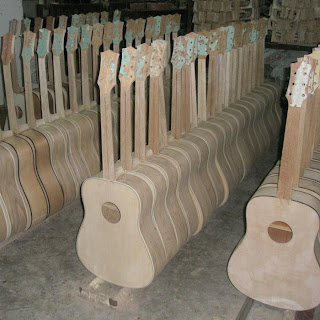Having worked in the retail side of the music industry now for several years, I've heard just about every complaint, criticism and bit of praise that one could imagine in regards to guitars. There comes a point in nearly every sale where a customer will ask "so where is this made?", and the response will either illicit a bevy of complaints and moans, or instant satisfaction. As you may guess, if I say it's made in america, there is usually an immediate calm. If I say korea, or china, or even mexico, there tends to be a visible apprehension that comes over the customer, and sometimes an outright disinterest in the guitar altogether. This has always bothered me, and I'm taking this post to share some thoughts on the subject.
I think it'a fairly safe to say that the majority of the most coveted guitars in the world are made here in america. From classics like Fender and Gibson, to more modern entries like Collings, Santa Cruz, and Paul Reed Smith. America has a long history of incredible guitar making and has rightfully earned it's spot in the dreams of aspiring guitar players. Perhaps it's this history that has set such a heavy stamp on the minds of guitarists when it comes to shopping for a guitar. Wether a customer is american, brazilian or eastern european, I have seen many times over the same eye roll associated with telling them the guitar that they are trying is not american made. I've always found this personally very silly. Don't get me wrong, I believe that there is a certain something to owning an american made guitar, but there is a lot of incredible quality out there, often as good if not better than the pieces made here.
The big stigma seems to be associated with China, Korea or any other asian country producing guitars. I imagine some of this is connected with some poor quality instruments made in the past by companies like epiphone. (who in recent years has been making very good guitars for low price points) However over the last ten years or so the standard of manufacturing has increased greatly, and I think many of the guitars coming out of those countries are damn good. Gretsch makes their electromatic series guitars in Korea, and I have loved the look, feel and sound of every one of those axes that has come into my hand. There are fine examples also seen in smaller companies like Reverend Guitars. They produce their unique guitars overseas and then have them setup and inspected at their headquarters here in the U.S. I have always been blown away by those guitars, and can't believe the attention to detail for under $1000. As I mentioned in my previous post, Comins guitars are highly detailed and fantastic sounding instruments that are made in a South Korean factory. None of this should really come as a surprise to anyone if you think about all the things in your everyday life that you rely on that are not made in america. I'm typing this blog post on my MacBook Pro, which is a wonder of technology and can do just about anything, and it's made in China! In fact it was expensive enough, I'd hate to think of what it would cost if they made it here in america!
On the other side of the coin, many customers seem excited and just as interested in a guitar made in a non asian country than one perhaps made in China or Korea. Guitars from australia like Cole Clark and Maton are amazing guitars that sell well and always impress. I've recently been blown away by New Zealand Luthier Christian Druery and his unique and beautiful acoustics (more on that in a future post). Spanish guitar makers still make some of, if not the best classical guitars. It seems ludicrous but many people will be considerably more bothered by a guitar made in China than one made in Australia. Whatever the reason is, I think its very silly to say the least. Who is to say that one country has more skilled luthiers than another? Or what difference the geographical location will have on quality? So many people gripe about mexican made Fender guitars, but the mexican factory is only a short distance from the california factory, and uses the same construction techniques! True that the many times the components will be cheaper in a guitar that is mass produced and will cost less, but thats why you are saving the money! And it's always an easy upgrade to swap in some higher quality pickups or pots.
In the end, no matter what the guitar, it's the player that counts the most not the instrument. Jimmy Page played a danelectro long before he made the Les Paul so iconic. Jack White still uses an old Airline guitar and make it sound damn good. Those were cheap guitars back in the day but it's more about how you use it than what it is. If we took the time to ignore the little sticker on the back of the headstock or inside the sound hole, we could open ourselves up to a whole new world of exciting guitars, and ones that even save ourselves a little money! I'm not saying ignore those classic american guitars, I'm just saying open up your eyes a little and enjoy the spectrum of amazing instruments made outside our little U.S bubble.
As always leave your thoughts or come by the shop and see what I'm talking about!
K.


No comments:
Post a Comment